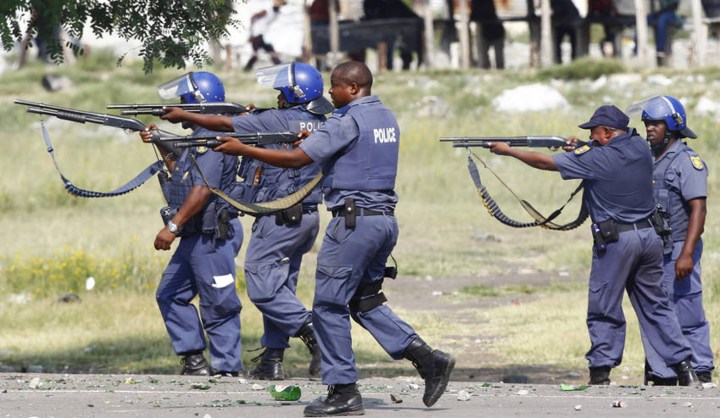South Africa
After 59 deaths allegedly at the hands of SAPS in Gauteng, no officer has faced justice

Police in Gauteng have been accused of brutality and it looks like the system meant to hold them accountable is failing. By GREG NICOLSON.
In the last year, the Independent Police Investigative Directorate (IPID) received 59 reported cases in Gauteng of alleged deaths as a result of police action, which
“It is alleged that the suspect was shot during a course of crime and the suspect died,” reads one brief description of a case opened against a SAPS officer. The circumstances of the killings were provided in an answer to questions in the Gauteng Legislature recently.
The next says an officer in Tembisa hit pedestrians with his car mirror and then pulled over. “The constable produced [his] service pistol and he shot randomly, one male was shot
The DA’s shadow MEC for community safety in Gauteng, Kate Lorimer, said on Tuesday that the deaths as a result of police brutality, rising to 59 from 45 the previous year, proved Gauteng cops were violating citizens’ rights without having to face justice. “These horrific statistics bear testament to the fact that the SAPS in Gauteng are violating basic human rights while no action is seemingly being taken to
Following the 59 cases in Gauteng IPID investigated in the last year of deaths as a result of police action, not a single officer has been suspended or charged.
Lorimer pointed to the most horrific complaints.
In Lenasia, an officer had responded to a call about domestic violence and on entering the premises allegedly sprayed a room with pepper spray. The complainant said a six-year-old child suffered breathing problems and then died. Another complaint said police responded to a community protest and as officers dispersed the crowd, both cops and protesters allegedly fired live rounds. Two people were found dead the next day. Some cases relate to officers allegedly killing their wives or girlfriends, or themselves. One case refers to children being stopped by cops and one allegedly being beaten to death. Another case involves an allegedly unarmed, mentally ill man being killed by a cop after he had a disagreement with a neighbour.
“Of 59 cases, you would have thought there would be more suspensions,” said Lorimer. While IPID reported the cases as relating to deaths as a result of police action, she said it’s valid to say they amount to police brutality.
Many of the complaints relate to killings in the line of duty – where officers responded to crime scenes where suspects who shot at cops or drew weapons were then killed by the police. It paints a scary picture of the situations cops regularly face. But Lorimer suggested we should still be cautious in judging those cases. “You get such different stories from the side of the SAPS and those
Referring to the mentally ill man who was killed, Lorimer said, “Why has no action been taken there? Seems bizarre to me.” She continued, “I think there’s a lack of follow-up from police. They don’t take action.” Lorimer said IPID was underfunded and involved in political debates that limit its ability to investigate cases effectively.
“The MEC must take decisive action in this matter so as to reassure the public that police officers do not receive special privileges as they are not above the law,” said Lorimer, referring to Gauteng Community Safety MEC Sizakele Nkosi-Malobane. The MEC cannot instruct SAPS or IPID to hold implicated officers accountable, but Lorimer said she should politically pressure SAPS to take action and also refer the issues to the MEC’s national counterparts. “If an officer has killed a person, they should be placed on suspension until an investigation into the matter is concluded.”
Many of the cases opened against the police officers in Gauteng are either still being investigated or are waiting for the National Prosecuting Authority (NPA) to decide on whether to lay charges. NPA national spokesperson Luvuyo Mfaku on Tuesday said investigations into SAPS officers were handled in the same manner as all other potential charges. “We treat each and any offence, as the NPA, the same.”
Police accountability will probably be called further into question soon. The IPID report says 240 people died as a result of police action in the last year, with the most occurring in Gauteng. There were 154 deaths in police custody, and again, the most died in Gauteng. IPID said most of the custody deaths occurred due to natural causes, followed by suicide cases and injuries sustained prior to custody. A total of 61 cases of police torture were reported across the country and there were 1,857 claims of assault.
The Gauteng department of community safety could not be reached for comment on Tuesday; nor could IPID representatives. SAPS Gauteng spokesperson Lieutenant-Colonel Lungelo Dlamini was unable to respond to questions sent on Tuesday afternoon before
As the Marikana example has shown, there are clear challenges holding police officers accountable through the current systems. Independent policing expert David Bruce said on Tuesday, “The international evidence is that criminal investigation, which is what the IPID does, and prosecution is generally ineffective as a means of holding police accountable for misuses of force, other than some of the most blatant and egregious [cases].”
He noted how officers involved in the killing of Mido Macia, the Mozambican taxi driver tied and dragged behind a police vehicle, were convicted, but those accused of murdering protester Andries Tatane were not. “This applies even in jurisdictions where the investigation and prosecution mechanisms are better resourced and less plagued by problems of various kinds than ours.” DM
Photo: Policemen open fire as protesting miners and residents burn tyres near Impala Platinum’s Rustenburg mine, February 16, 2012. Photo: REUTERS/Mike Hutchings


















 Become an Insider
Become an Insider